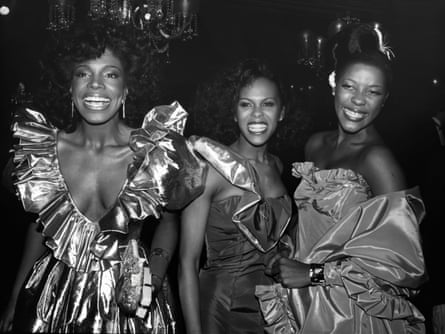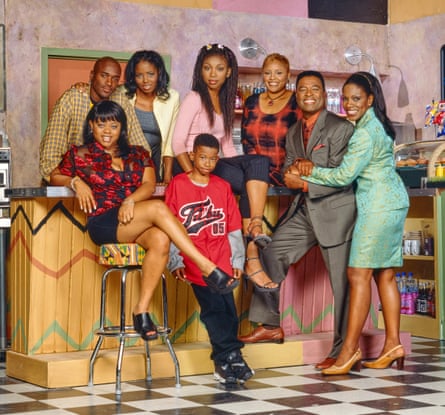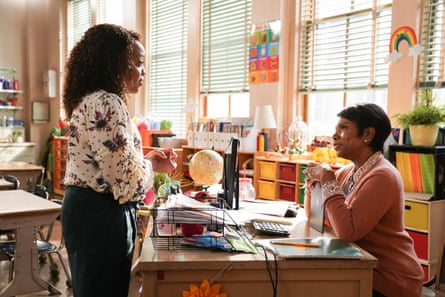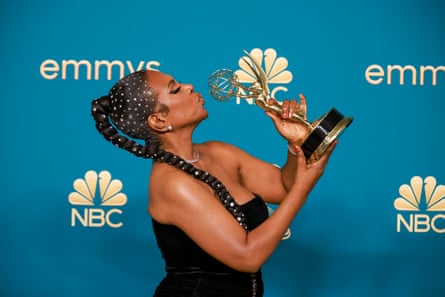Floral arrangements have been piling up on Sheryl Lee Ralph’s Los Angeles doorstep for the past couple of weeks. “My house is now my own personal rainforest,” she jokes.
The congratulatory bundles haven’t stopped since Ralph grabbed this year’s Emmy for her supporting role in the mockumentary sitcom Abbott Elementary. “I am floating on cloud 999 ever since they said ‘Sheryl Lee Ralph’ from the Emmy stage,” she says.
After nearly five decades in the business, she was so shocked when her name was called that Quinta Brunson, Tyler James Williams and other Abbott castmates had to ease her out of her seat and guide her up to the Microsoft Theater stage. In an acceptance speech for the ages, she launched into song before declaring, “this is what believing looks like … this is what striving looks like. Don’t you ever, ever give up on you.”
The song she belted out was jazz vocalist Dianne Reeves’s Endangered Species, a suitable choice considering Ralph is the only the second-ever Black woman to take home the trophy in this category. After Ralph’s win Jackée Harry, another estimable peer, reflected on her own “lonely experience” 35 years ago of becoming the first Black woman to win a supporting comedy actor Emmy for her vixen role in the neighborhood sitcom 227 – a part NBC had originally wanted Ralph to play. “It’s come full circle. Congrats, Sheryl & welcome to the club,” Harry tweeted.
The popular refrain on Ralph’s prize is that it was long overdue, or a study in perseverance, as she mentioned in her acceptance speech. But even that doesn’t quite capture why this 65-year-old mega-talent had been so criminally underappreciated to this point. “But isn’t that good?” she says. “Isn’t it such a blessing that I could remain relevant after all of these years?”
It’s not as if Ralph was some diamond in the rough. By 1974, she had been named one of the top ten college women in America by Glamour magazine and was crowned Miss Black Teen-age New York.
Sidney Poitier gave her her first on-screen break in the 1977 hangout film A Piece of the Action. Scroll her IMDb page, and you’ll see credits for soaps (Search for Tomorrow), sitcoms (Designing Women) and even animated flicks (Disney’s Oliver & Company). But it’s Abbott, in which Ralph steals scenes as uptight doyenne Barbara Howard, that cements her as a crossover star.
Ralph takes sport in guessing her fans’ ages based on which of her many credits they might know her from. Personally, I considered blurting out “Ray Donovan”, but couldn’t stop myself from sputtering about her turn as super stepmom Dee Mitchell on the 90s sitcom Moesha.

That sitcom, a vehicle for the R&B star Brandy and a staple of the 90s Black sitcom boom, has picked up new fans in the steaming era, too – not least Ralph’s young Abbott scene partners. “One day, we came back to work and this little boy looked at me and said, ‘Miss Ralph, I’ve been watching you my whole life,’” she says.
All of which is to say: Ralph has always stood out. Her Broadway performance in the original production of Dreamgirls earned a 1982 Tony nomination, after all. It’s just that in her chosen profession, the slog is always somehow longer for Black actors. Eddie Murphy and Whoopi Goldberg are the rare Black actors who were recognized as prodigies and set on an unbroken road to superstardom.
But most every other Black actor who wasn’t already a musician (Ice Cube) or a sports hero (Jim Brown) has to endure, has to survive. That, too, can be exhausting. “In the beginning, they used to say [of Black actors] ‘Just give them a comedy because [Black people] love to laugh,’” Ralph recalls. “‘The dramas … I don’t know. They’re kinda difficult.’ You would hear things like that that, when you say them back now, it’s hurtful.”
After A Piece of the Action, Ralph didn’t land her next film credit until Oliver & Company, which was released in 1988. That drought, she says, “really started me on TV and on stage”. During her Dreamgirls run Ralph fell into anorexia, so great was the pressure to keep thin.
Most heartbreaking of all, she and her castmates sold their stake in the franchise for a dollar. “We don’t participate in the greatness that is Dreamgirls,” she laments. This is the same production that legitimized Beyoncé as a film actress, won Jennifer Hudson an Oscar and is still drawing crowds. “A Chorus Line came about same as Dreamgirls,” Ralph says. “The cast came together for a class action suit and got their money for what they put into the show. But we just didn’t do that. We signed away our rights when we were very young. That’s just the way that happened.”
Earlier this year, Ralph opened up to the Hollywood Reporter about the plight of being what she calls “Black famous”. In Jamaica, where Ralph split her formative years and has always maintained a loyal following since that first film credit, her Emmy win was both splashed on the front pages of national newspapers and much discussed on the morning shows.

In the US, notoriety has been far more elusive. She shared an anecdote about her experience working on the short-lived 2019 CBS sitcom Fam and being confronted on the first day by an executive producer who asked, without irony, “So tell me, what have you done?”
“I always knew that Black folks were aware of me and my work, but I always knew I had a certain amount of crossover appeal, too,” she says.
On the night of Abbott’s second season premiere last month, Ralph had a few friends over for a watch party, including one ex-Fam stage manager who had witnessed that producer size up Ralph. “Sheryl, look at you now,” the friend said.
For another friend that story always seemed like the height of privilege.
“What always fascinated him about that moment was that it was his responsibility to know who you are, no matter your color, to make sure his production has absolute success with these millions that are being spent,” Ralph says.
“Now when I look at success, I look at it through the lens of, ‘I know the next time I go on a new set, they will know exactly who I am.’”
On Abbott Elementary, show creator and executive producer Quinta Brunson plays a new teacher who unabashedly admires and looks to Ralph’s character for guidance. That’s not too far from reality. Ralph still remembers how awestruck Brunson was when she turned up on the set of A Black Lady Sketch Show in 2019, where Brunson was writing and co-starring at the time. “She just kept looking at me,” Ralph remembers. “Like, she was actually studying me.”
Soon after, Brunson offered her a part in the sitcom she wrote about a ragtag group of Philadelphia primary school teachers fighting hopelessly against the systemic failures in public education. But Ralph says Brunson felt bad about having to ask her to read the Miss Howard part for executives to seal the deal. Worse, Ralph didn’t think the character was especially meaty on the page. “I honestly thought I was going to be invisible,” Ralph says.
Not only did that not happen, but veteran teachers regularly tell her just how much her performance makes them feel seen. “People are like, ‘I’m living for Miss Howard,’” Ralph says. “I had no idea. Ugh, it just makes me feel so good.”
The show debuted to little fanfare last December, but eventually gained its audience and became the first ABC comedy to quadruple its rating after airing. Its pilot episode scored Brunson an Emmy for comedy writing. Like Ralph’s, her golden moment also went viral, albeit against her will. Late-night host Jimmy Kimmel thought it would be funny to double down a limp joke by lying on the floor next to Brunson while she delivered her acceptance speech. But no one laughed, and Ralph in particular was not amused. After the awards show she sought Kimmel out, and scolded him for his “disrespect”. A few days later he apologized to Brunson on his show for stealing her spotlight with his “dumb comedy bit”.
“I’m absolutely good with the resolution,” Ralph says now. “As long as Quinta is fine with it, I’m fine with it. But my initial reaction was my initial reaction! You know how mothers are.” For Moesha fans, it was a vintage Dee Mitchell moment.
As disappointing as it is to see Ralph finally get her just due now, her recognition syncs up nicely with Hollywood’s changing attitudes toward young Black stars. Zendaya (Euphoria), Lizzo (Watch Out for the Big Grrrls) and Jerrod Carmichael (Rothaniel) were also big winners on Emmy night. “It’s interesting to be in an era now of such Black excellence and abundance, and for people to not look at you as a fluke anymore,” Ralph says. “But to be looked at as the real deal, to be able to get these projects greenlit no matter what color the people are. It’s important.”
And she’s especially thrilled that she got to share her special night with Brunson – who, at 32, is just getting warmed up in the business. “Quinta can do so many things,” Ralph gushes. “Write. Produce. I’m sure there’s a bit of a director in her.”

Now at least there’s no more discounting the woman who helped set the stage for the current crop of Black prodigies in Hollywood. After Ralph’s Emmy win, Beyoncé, who starred in the 2006 theatrical production of Dreamgirls, sent a bouquet and card “to the original Dreamgirl”. Jennifer Hudson, who co-starred with Beyoncé in the film, had Ralph on her daytime show – where Ralph taught Hudson how to do the Dreamgirls sway. (“I can’t believe I got to have that moment with you,” Hudson shrieked.)
When we spoke, Ralph had yet to celebrate properly with the original Dreamgirls, who are still very much in the game. Jennifer Holliday has reprised her Tony-winning role as Effie White for a current Dreamgirls production in Atlanta. Loretta Devine, who won an Emmy in 2011 for a guest spot on Grey’s Anatomy, is still expanding her range on film and TV – most notably as the matriarch of the popular Netflix sitcom Family Reunion. It’s a testament to true resilience. But for Ralph at least, there was no other option. “This is what I love to do,” she says of performing. “And there was no way I was not going to do it.”
Given Ralph’s versatility, it’s hard not to wonder whether she’ll soon be hoarding every award in sight. EGOTing is a real possibility. “You’re not the only person who’s been saying it,” she says. “You can win a Grammy many different ways – reading, for example.” An enterprising music producer could breathe new life into In the Evening, her 1984 pop single that remains a DJ favorite. “The work has been started to find the right projects.”
One of the offers Ralph has been mulling recently would put her back on a Broadway stage alongside the powerhouse actor-singer and Tony-winning phenom Audra McDonald. Now that Ralph is finally getting her flowers, it’s only right that she get to play the one part that has eluded her throughout her career: the shoo-in.
“And you know what’s interesting? The way I got it, people are standing, ‘God, the Emmys have never been so good until this moment,’” she says. “They’re saying that in the year that I was there.”

